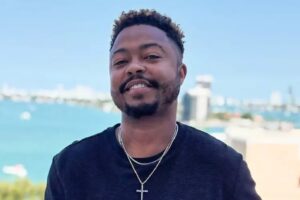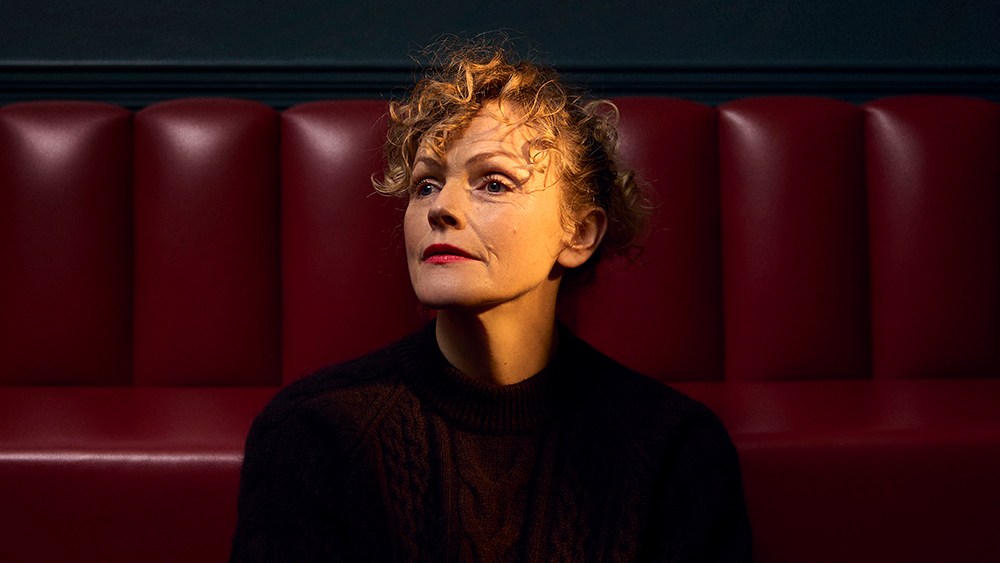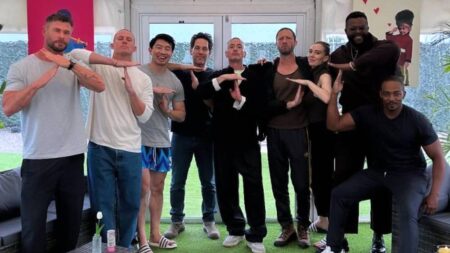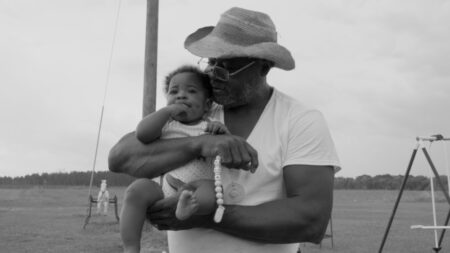Having recently been BAFTA nominated for her role as former IRA member and hunger striker Delours Price in the hugely acclaimed Disney+ series “Say Nothing” about the Troubles, Maxine Peake is now heading to cinema screen as another political figure.
In “Words of War,” releasing May 2, the British star — best known for her roles in “The Theory of Everything,” “Black Mirror” and “Peterloo” — plays late Russian journalist Anna Politkovskaya. In the early 2000s, Politkovskaya’s investigative work reporting from Chechnya and her fearless coverage of the Russian military invasion and atrocities committed by its troops brought her national and international reputation, but also saw her become a thorn in the side of Vladimir Putin’s regime. After years of battling intimidation, threats and even a poisoning, she was assassinated outside the elevator of her Moscow apartment in 2005.
Directed by James Strong and also starring a heady line up of British stars, including “White Lotus” survivor Jason Isaacs as Politkovskaya’s husband and Oscar nominee Ciaran Hinds as her Nobel Peace Prize-winning newspaper editor, “Words of War” also comes with the backing of Sean Penn, who joined as a producer (although Peake says she’s yet to meet him).
Speaking to Variety, Peake discusses giving Politkovskaya a regional English accent (and why she didn’t want to “fall down the trap” of making her sound what would be perceived as “posh”) and why she’s drawn to stories about the “oppressed’s battle against the oppressor.” She also notes the poignancy of a film about journalists under attack for their amid the latest Gaza war, which has become the deadliest for journalists in history.
I arrogantly consider myself pretty well-informed, but have to admit before watching “Words of War” I knew very little about Anna Politkovskaya. Were you aware of her before the film came your way?
I knew the name. I knew she’d been assassinated. But that’s all that I knew. I remember it briefly happening in the news. So I felt, you know, why? Why didn’t I know? I should have done. So when the script came through I was so excited. I thought I’d have to audition, but when Miriam Segal the producer said, no, it was an offer. God bless her. Because I know I’m not a name that can get a film financed — I know the way the business works. So I was really honored that Miriam had sort of taken that risk.
Did you do a deep dive into Anna as a person and her life and work?
Yeah. Obviously, we’ve got her Russian diaries. She’s written books and books. It was a deep dive into Putin and his regime. But I was also surprised how many people I spoke to had met her. It was really odd. People were just like, “Oh, I did something with her through an organization.” Someone else I know had spoken to her not long before her assassination. Nobody seemed to have spent a long time with her. They’d either have brief conversations with her or knew somebody who knew her. But I tried to glean little bits and was tried to piece her essence together.
I really enjoyed the fact that everyone in ‘Words of Wars’ isn’t speaking English with a Russian accent, but with a regional English accent. It reminded me of “Chernobyl” and “The Death of Stalin.” What was the decision behind this?
When they said, we’re not going to do the Russian accent, I thought, well, do I then do the standard English RP [received pronunciation]? But for me, I thought it gives me a bit too much of a straightness. It’s that whole argument about class, isn’t it? And it’s Moscow and Russia and the class system is totally different there. So I didn’t want to just fall down that trap of going, well, she’s got to be what we will perceive in England as posh. Of course, she was from the intellectual class. But I thought I’m just going to soften off my accent. It’ll still give me a bit of earthiness, which I think she had. Then Jason said, I’m just going to soften my accent as well.
‘Words of War’
Rolling Pictures
You’ve mentioned Jason Isaacs, but you’re also starring alongside a who’s who of British acting talent, old and new. There’s Ciaran Hinds, Harry Lawtey, Ellie Bamber, Ian Hunt, Fady Elsayed, to name a few. Did it at all feel strange to be telling this very Russian story with this very British cast… and in English?
I think once you started, you just bought into it. And everyone was so brilliant. I think everyone just felt very much that this was a story they wanted to be part of. And I think it worked, I believed the world. Everyone was so dedicated to it, with these wonderful actors coming and just doing a couple of scenes because they felt passionate about the story.
The poignancy of the story feels incredibly strong. Obviously, Putin is still Russian president, has invaded Ukraine and has even more power since the events in the film. But talking about the attacks on journalist, we’ve seen huge numbers killed in Gaza over the last year. I don’t know when you shot this film, but was that a consideration or something you’ve reflected on since?
We shot this about 3 years ago. But 2024 was the most dangerous year to be a journalist. And the majority of those journalists were killed in Gaza. Just before I made this, I was invited to the memorial of Sheeren Abu Akleh [the renowned Palestinian Al Jazeera reporter who was shot and killed by Israeli troops in 2022]. It’s obviously been over 1000 days since Shereen was murdered and nobody’s been prosecuted and her family has been fighting for justice. But obviously it’s escalated since then. And with what’s been going on the film feels even more prescient.
The end of ‘Words of War’ is really powerful – showing numerous journalists who have been killed over the years. But it almost feels terrifyingly out of date.
Yeah. It’s horrific. It’s a global epidemic.
Away from “Words of War,” you’re a BAFTA nominee for the excellent “Say Nothing” about the Irish troubles. Firstly, congratulations. But does it feel that a show about such a powerful and still highly sensitive subject would get such an incredible reaction? Was it something you were expecting?
Thank you so much. I personally felt that the show would reach an audience and that there is an appetite out there for powerful political pieces, but I didn’t realise how positive the response would be. There is a generation that is either new to this or, in the case of the young people of Northern Island, is still living and dealing with the legacy of the effect of British colonialism and apartheid. What surprised me most across all generations was the lack of misinformation about the events in Northern Ireland and the history of the origins of the British colonial rule and its devastating impact.
But is it a story you ever expected to be told on Disney+?
I have to admit, it wasn’t! When I told people I was working on a piece about the Troubles for Disney, there were quite a few raised eyebrows. Thank goodness they took on the challenge.
Like Anna Politkovskaya, Dolours Price was another major political figure with a strong connection to conflict and colonial rule, although this time from the other side. Would you say this was purely a coincidence or are these individuals and subjects ones your often more drawn to?
I am absolutely drawn to these stories and fortunately they both came my way. I have to thank producer Miriam Segal for “Words of War” and casting director Nina Gold on “Say Nothing” for believing I could bring these two extraordinary women to life. For me it’s stories that tell of the oppressed’s battle against the oppressor that pique my interest and align with my own values and beliefs.
Read the full article here








